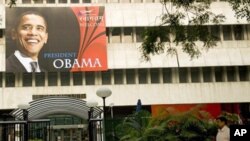Excitement is mounting in India over the upcoming visit of U.S. President Barack Obama as was evident this week during a press conference given by Indian Foreign Secretary Nirupama Rao.
He told journalists that a "warm welcome" awaits President Obama, who arrives in India on Saturday, along with productive talks on a wide range of mutual concerns.
"President Obama's visit will be an opportunity to once again underscore that our shared values of democracy, openness, pluralism and fundamental freedom form the bedrock of our strategic partnership," said Rao. American officials have said the trip is designed to deepen the bilateral relationship. Indications are that both sides will tread softly on delicate issues.
Mr. Obama's first stop will be Mumbai, India's bustling financial center. There, the president and U.S. executives plan to attend a summit with Indian business leaders.
U.S. officials predict bilateral trade with India will exceed $50 billion this year and they say they hope U.S. exports to India will double within five years.
President Obama will stay at the Taj Palace Hotel, one of several facilities attacked by terrorists across the city two years ago, killing more than 165 people. Mr. Obama is expected to meet with victims' families and deliver a speech reaffirming America's commitment to fighting terrorism.
On Sunday, the president is scheduled to travel to the capital, New Delhi, to attend a small private dinner at the home of Prime Minister Manmohan Singh. The two men are to hold a summit on Monday, leading to what American officials say will be a "deeper, broader" U.S.-India partnership across the board.
Despite drawing closer to Washington, India remains concerned about some U.S. policies, particularly its billions of dollars in military assistance to Pakistan, says Lalit Mansingh, a former foreign secretary in the Indian government.
"I think there should be some accountability on how Pakistan uses that assistance," Mansingh says. "If it is used for fighting terrorism, we have no complaint. If it is for using arms to fight India, we have a real problem."
Last month, the Obama administration pledged to increase its military aid to Pakistan to help the country fight extremism. But U.S. officials said aid will be denied to any Pakistani army units linked to human rights abuses.
The two leaders will also discuss the future of stabilization efforts in Afghanistan, says Lalit Mansingh, in which the Afghan government with U.S. and NATO help, has been pursuing reconciliation talks with the Taliban.
"We don't think negotiating with the Taliban is such a good idea. Because they're the ones who are your [the United States'] real enemies," Mansingh says. "If you compromise with your enemies, I don't see what kind of Afghanistan you leave behind when American troops go out."
Some delicate subjects will likely remain off the table, say analysts, such as violence between security forces and separatists in Indian-administered Kashmir. Washington has said that troubled region is an issue to be addressed bilaterally between India and Pakistan.
On Monday, the eve of Mr. Obama's departure for Indonesia, he is scheduled to be treated to a formal state dinner in the Indian capital, reciprocating an event the U.S. president held for Prime Minister Singh at the White House last November.




